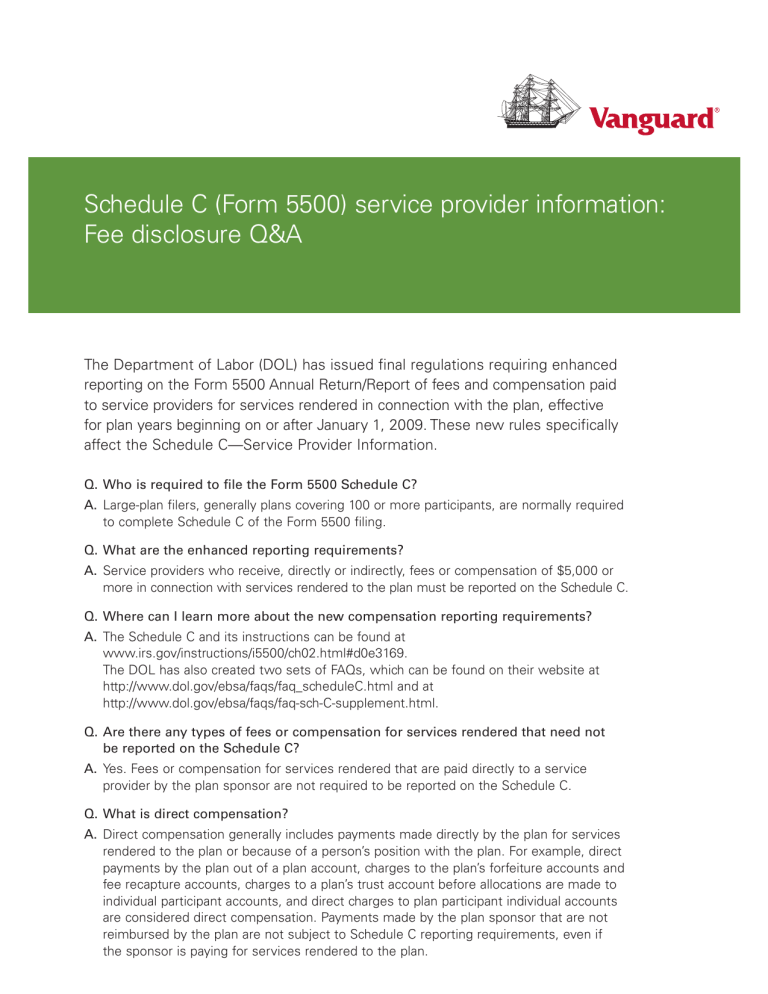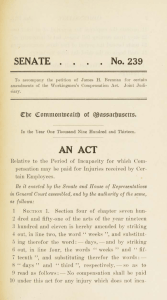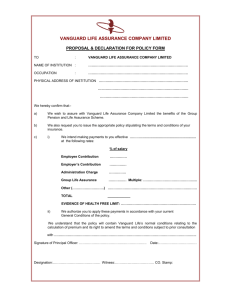Schedule C (Form 5500) service provider

Schedule C (Form 5500) service provider information:
Fee disclosure Q&A
The Department of Labor (DOL) has issued final regulations requiring enhanced reporting on the Form 5500 Annual Return/Report of fees and compensation paid to service providers for services rendered in connection with the plan, effective for plan years beginning on or after January 1, 2009. These new rules specifically affect the Schedule C—Service Provider Information.
Q. Who is required to file the Form 5500 Schedule C?
A.
Large-plan filers, generally plans covering 100 or more participants, are normally required to complete Schedule C of the Form 5500 filing.
Q. What are the enhanced reporting requirements?
A.
Service providers who receive, directly or indirectly, fees or compensation of $5,000 or more in connection with services rendered to the plan must be reported on the Schedule C.
Q. Where can I learn more about the new compensation reporting requirements?
A.
The Schedule C and its instructions can be found at www.irs.gov/instructions/i5500/ch02.html#d0e3169.
The DOL has also created two sets of FAQs, which can be found on their website at http://www.dol.gov/ebsa/faqs/faq_scheduleC.html and at http://www.dol.gov/ebsa/faqs/faq-sch-C-supplement.html.
Q. Are there any types of fees or compensation for services rendered that need not be reported on the Schedule C?
A.
Yes. Fees or compensation for services rendered that are paid directly to a service provider by the plan sponsor are not required to be reported on the Schedule C.
Q. What is direct compensation?
A.
Direct compensation generally includes payments made directly by the plan for services rendered to the plan or because of a person’s position with the plan. For example, direct payments by the plan out of a plan account, charges to the plan’s forfeiture accounts and fee recapture accounts, charges to a plan’s trust account before allocations are made to individual participant accounts, and direct charges to plan participant individual accounts are considered direct compensation. Payments made by the plan sponsor that are not reimbursed by the plan are not subject to Schedule C reporting requirements, even if the sponsor is paying for services rendered to the plan.
Q. Are redemption fees, deducted directly from plan assets, reportable on Schedule C?
A.
No. Redemption fees are used to defray fund costs associated with participants’ transactions and are paid directly to the investment fund. These fees are not retained as compensation by a service provider and are therefore not reportable compensation on the Schedule C
(see DOL Supplemental FAQ 12).
Q. Does Vanguard earn "float" income?
A.
Vanguard maintains pooled or “omnibus” accounts to facilitate transactions for defined contribution plans for which Vanguard provides recordkeeping services. The pooled account holds contributions pending investment direction and distributions pending redemption of a check. To the extent there are any earnings (i.e., “float”) on the monies that accumulate in the pooled account, the earnings are allocated proportionately among all of the Vanguard mutual funds in order to offset expenses of the mutual funds. This cash management process ultimately lowers the expense ratios of the mutual funds, thereby benefiting all fund shareholders, including plan participants.
With respect to contributions pending investment direction, the potential earnings period begins on the date the contribution is received and ends on the date the contribution instructions are received in good order. With respect to distributions pending redemption of a check, the potential earnings period begins on the date the distribution check is written and ends on the date the check is presented for payment or, if applicable, the date the funds attributable to the outstanding benefit check are moved to a plan forfeiture account.
The earnings rate is a rate that is based on the federal funds rate. Administrative procedures are in place to limit any potential float period. For specific information regarding such procedures, refer to the Administration Manual for Defined Contribution Plan Clients which is available on Vanguard's Plan Sponsor Bridge ® .
This disclosure of float income is intended to satisfy the guidance under DOL Field
Assistance Bulletin 2002-03, to the extent applicable.
Q. What is indirect compensation?
A.
Indirect compensation is compensation received from sources other than the plan or plan sponsor in connection with services rendered to the plan or because of a person’s position with the plan. Such compensation would include, but is not limited to, gifts, entertainment, and attendance at conferences and events.
Q. Are estimates or formulas an option for reporting fees or compensation received by service providers?
A.
Yes. Service providers may use a formula or estimate for reporting indirect compensation to plan administrators. Service providers that provide an estimate of their indirect compensation may use any reasonable method as long as the method is disclosed along with the estimate.
Q. Does reportable indirect compensation include fund expense ratios (i.e., fees and expense reimbursements received by a person from an investment fund that are charged against the fund or account and reflected in the value of the plan’s investment)?
A.
Yes. As a result, for example, management fees paid by a mutual fund to its advisor are reportable compensation (see Q&A directly below for an alternative reporting rule for
“eligible” indirect compensation).
> 2
Q. Is there an alternative reporting rule for “eligible” indirect compensation?
A.
Certain forms of indirect compensation may be classified as eligible indirect compensation provided such compensation includes only fees or expense reimbursement payments charged to investment funds and reflected in the value of the investment return of the participating plan or its participants (e.g., mutual fund expense ratios). In addition, service plan providers earning this type of indirect compensation must provide the required written disclosures to the plan sponsor in order for the compensation to be considered eligible indirect compensation. If the indirect compensation meets these requirements, the alternative reporting option described in the Q&A immediately below can be used.
Q. What is the alternative reporting option?
A.
For service providers, whose only compensation in relation to the plan is limited to eligible indirect compensation, the alternative reporting option can be used, provided that written disclosure(s) are furnished to the plan administrator. The alternative reporting option allows Schedule C filers to provide only identifying information on the person(s), who provided the plan with the required written disclosures (i.e., the name and Employer
Identification Number (EIN) or address of the person(s) providing the written disclosure).
Q. Will Vanguard use the alternative reporting option?
A.
Yes. Vanguard will provide the required written disclosures, where applicable, for any compensation that meets the definition of eligible indirect compensation. And therefore,
Vanguard will use the alternative reporting option.
Q. Will Vanguard obtain the required written disclosure for eligible indirect compensation for non-Vanguard investments?
A.
Yes. Vanguard has requested, on behalf of our clients, written disclosures from outside fund companies that have investments within our clients’ plans. If we do not receive a timely response from a fund company, Vanguard will assume that the fund company is relying on their funds’ prospectus and Statement of Additional Information (SAI) to satisfy the requirements for eligible indirect compensation.
Q. How will Vanguard complete Part I, Line 1, of the Schedule C, regarding service providers that have received only eligible indirect compensation?
A.
For clients electing our Form 5500 service, Vanguard plans to complete Part I, Line 1, of the Schedule C by indicating that Vanguard has provided the required disclosures for fund companies that have received only eligible indirect compensation in relation to services rendered to the plan. Please note that Vanguard will not create the written disclosures but intends only to collect the disclosures from the outside fund companies in order to meet the alternative reporting option requirements. This practice is in accordance with the DOL’s FAQ 18, which states, “Any person can provide the required disclosures.”
The disclosures collected from the fund companies are not the property of Vanguard and have been prepared solely by the outside fund companies.
Q. How does Vanguard plan to comply with the new reporting requirements?
A.
Vanguard has historically reported fees paid directly by the plan’s trust. However, Vanguard has enhanced its annual plan-level reporting package to include a more detailed direct compensation report. The report also now includes loan origination fees. Vanguard is also supplying information on indirect compensation in a new supplemental report. Information on eligible indirect compensation will be provided in a separate disclosure document on the Vanguard Plan Sponsor Bridge, Investments tab.
> 3
Q. Why is Vanguard including loan origination fees in the administrative report, when Vanguard has not done so in the past?
A.
Vanguard has always disclosed loan origination fees to participants at the time of the loan withdrawal and to plan sponsors in the fee agreements. To provide a more consolidated fee report to clients, Vanguard is also reporting loan origination fees in the administrative fees report.
Q. Are gifts, gratuities, meals or entertainment, or reimbursement of expenses in connection with attendance at an educational conference received by an employee of the plan sponsor reportable on the Schedule C?
A.
Persons subject to reporting include both individuals and trades or businesses. As a result, reporting would be required for an employee if he or she received, directly or indirectly,
$5,000 or more in reportable compensation in connection with services rendered to the plan or the employee’s position with the plan. Reportable compensation includes amounts separately received by an employee, such as gifts, gratuities, meals, or entertainment, and the reimbursement of expenses associated with educational conferences.
Reimbursement of educational conference expenses may be disregarded if attendance at the conference is approved by a plan fiduciary (other than the person attending the conference) in accordance with a written educational conference policy. (See DOL
Supplemental FAQ 4.)
Q. Must all gifts and entertainment be reported?
A.
No. According to the DOL (FAQ 34), “Administrators are allowed to exclude [from the
$5,000 threshold explained in the Q&A directly above] nonmonetary compensation of insubstantial value (such as gifts or meals of insubstantial value). The gift or gratuity must be valued at less than $50, and the aggregate value of gifts from one source in a calendar year must be valued at less than $100. If the $100 aggregate value limit is exceeded, then the value of all the gifts will be reportable compensation. The instructions state that, for this purpose, gifts of less than $10 do not need to be counted toward the $100 limit.
Gifts of less than $10 also do not need to be included in calculating the aggregate value of all gifts required to be reported if the $100 limit is exceeded."
Q. Will Vanguard provide information on gifts and entertainment, including educational conference benefits?
A.
Yes. Vanguard will provide gifts and entertainment reports for all applicable nonmonetary compensation, both given and received by the client and/or service provider, at the plan level. With respect to gifts and entertainment given to Vanguard employees, we will track and report estimated values of the gifts or entertainment received.
Q. How will Vanguard report gifts and entertainment on the Schedule C?
A.
For clients electing our Form 5500 preparation service, we will report, for each plan, all applicable gifts and entertainment provided to or tracked by Vanguard on Part I, Lines 2 and
3, of the Schedule C, at the service-provider level. Reporting nonmonetary compensation at the service-provider level is a permissible method. However, should the client choose, we can report gifts and entertainment for each individual receiving nonmonetary compensation on the Schedule C.
NOTE: The DOL has stated that, because of privacy concerns, the use of a Social Security number on the Schedule C may result in rejection of the filing. As a result, the EIN of the client and/or service provider receiving reportable nonmonetary compensation will be reported on Part I, Lines 2 and 3, of the Schedule C.
> 4
Q. What should a plan administrator do if a service provider does not provide all of the information necessary to complete the Schedule C?
A.
Plan administrators may identify, on Line 4 of the Form 5500 Schedule C, service providers who fail to provide information needed to complete the Schedule C. However, the instructions to the Schedule C caution that, before identifying a service provider as a person who failed to provide the requisite information, the plan administrator should contact the service provider to request the information and inform the service provider that they will be listed on the Schedule C as failing to provide necessary information.
Q. Is there any transition relief?
A.
Under good-faith transition relief for the 2009 plan year, a plan administrator is not required to report any service provider that has supplied a statement attesting that the provider made a good-faith effort to finish necessary recordkeeping or information system changes in a timely fashion but was unable to complete those changes. (See DOL FAQ
40 and DOL Supplemental FAQ 10.)
Q. What responsibility does the plan sponsor have with regard to the enhanced reporting of service provider fees and compensation?
A.
The plan sponsor maintains the fiduciary responsibility to ensure plan investments are appropriate, including oversight of investment return, risk, and expenses. Plan sponsors with plans offering non-Vanguard funds, or having relationships with other service providers
(i.e., attorneys, accountants, etc.), may need to approach those service providers to obtain information not reported by Vanguard (i.e., gifts given or received by other service providers). As a result, as previously communicated, our Form 5500 service is no longer
“signature ready,” because this additional information from outside providers requires more scrutiny by the plan sponsor.
Q. Whom should I contact with additional questions regarding the new reporting requirements?
A.
Please contact your relationship manager with any questions or concerns regarding the new reporting requirements for the Schedule C. If your plan is recordkept by Vanguard, contact our Compliance and Annual Plan Reporting Services at aprs@vanguard.com.
> 5
Connect with Vanguard
® >
institutional.vanguard.com
>
800-523-1036
P.O. Box 2900
Valley Forge, PA 19482-2900
© 2010 The Vanguard Group, Inc.
All rights reserved.
CAPQA 072010





